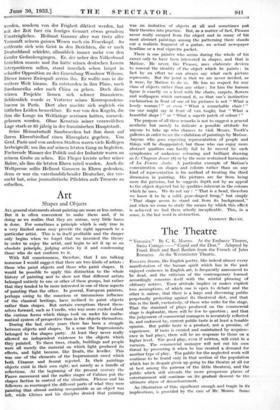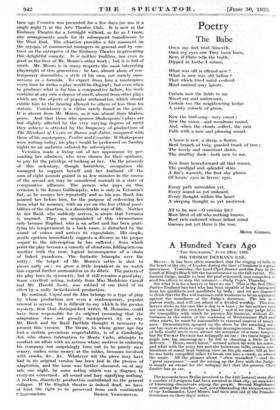The Theatre
"Veronica." By C. K. Monro. At the Embassy Theatre, Swiss Cottage.—" Cupid and the Don." Adapted by Frank Birch and Basil Bartlett from the French of Jules Romains. At the Westminster Theatre.
ENGLISII drama, like English poetry, like indeed almost every manifestation of the human spirit which has in the past enjoyed eminence in English art, is frequently announced to be dead, and the criticism of the contemporary learned accordingly concerns itself with the wistful phrasing of Obituary notices. Their attitude implies or makes explicit two assumptions, of which one is open to debate and the other is untrue, that there is a large and discerning public perpetually protesting against its theatrical diet, and that this is the fault, exclusively, of those who write for the stage. That the standard of plays produced on the commercial stage is deplorable, there will be few to question ; and that the judgement of commercial managers is accurately reflected in, and endorsed by, current public taste is at least a tenable opinion. But public taste is a product, not a premise, of experience. If taste is created and maintained by acquiesc- ence in bad- plays, there will be no response to those on a higher level. The good play, even if written, will exist in a vacuum. The commercial manager will not cut his own throat by presenting it when he has created a demand for another type of play. The public for the neglected work will continue to be found only in that section of the population which has in despair given up going to the theatre at all (or at best among the patrons of the little theatres), and the public which still attends the more prosperous places of entertainment will continue on its- gradual descent to the ultimate abyss of disenchantment.
An illustration of this, significant enough and tragic in its implications, is provided by the case of Mr. Monro. Some time ago Veronica was presented for a few days (or was it a single night ?) at the Arts Theatre Club. It is now at the Embassy Theatre for a fortnight without, so far as 1 know, any arrangements made for .its subsequent transference to the West End. The situation provides a fair comment on the myopia of commercial managers in general and by con- trast on the enterprise of the Embassy Theatre in presenting this delightful comedy. It is neither faultless, nor even as good as the best of Mr. Monro's other work ; but it is full of merit. Mr. Monro is in many respects the most interesting playwright of this generation : he has, almost alone of con- temporary dramatists, a. style of his own, not merely man- nerisms or a formula. , To expect from him a masterpiece every time he writes a play would be illogical ; but even when he produces what is for him a comparative failure, his work contains at any rate a degree of merit, absent from other plays which are the objects of popular acclamation, which should entitle him to the hearing allowed to others of less than his stature. . Consistency is a virtue rarely found in the great. It is absent from Mr. Monro, as it was absent from Shakes_ peare. And that those who sponsor Shakespeare's plays are but slightly affected by the very varying degrees of merit they achieve is attested by the frequency of productions of The Merchant of Venice or Romeo and Juliet, compared with those of his masterpiece, Troilus and Cressida. If Shakespeare were writing today, his plays would be performed on Sunday nights to an audience enlisted by subscription.
Veronica made a living out of her appearance by per- suading her admirers, who were chosen for their opulence, to pay for the privilege of looking at her. On the proceeds of this sedentary, though hazardous, occupation she managed to support herself and her husband (if the sum of eight pounds gained in as few minutes in the course of the second act may be considered normal) in a state of comparative affluence. The person who pays on this occasion is Sir James Gullhoppity, who is only in Veronica's flat, as he assures her repeatedly and as his son, Basil, has assured her before him, for the purpose of redeeming her from what he assumes, with an eye on the less ethical possi- bilities of the situation, is a discreditable way of life. Neither he nor Basil, who suddenly arrives, is aware that Veronica is married. They. are acquainted of this circumstance only because Raphael, who is an artist and has been grati- fying his temperament in a back room, is disturbed by the sound of voices and arrives to expostulate. His simple, gentle egotism immediately suggests a divorce as the 'proper sequel to the interruption he has suffered ; from which point the play becomes a comedy of situations, folding into one another with the neat, logical inconsequence of a chain of linked paradoxes. The fantastic triumphs over the witty : the target of Mr. Monro's satire is shot to pieces early on ; we grow a little impatient as we watch him expend further ammunition on its debris. The pattern of the play loses its symmetry, but it still remains a good play. Some excellent acting, notably from Miss Madeleine Carroll and Mr. Harold Scott, was robbed of one third of its effect by a sadly lackadaisical production.
By contrast, Cupid and the Don belongs to a type of play by whose production not even a contemporary, popular interest is served. It is difficult to say which is the greater mystery, how that distinguished writer, M. Romains, could have been responsible for its original (assuming that the adaptation does not grossly misrepresent it), or why Mr. Birch and Sir Basil Bartlett thought it necessary to present this version. The theme, to whose genre age has lent a certain precarious respectability, is of a Cambridge don who chases infatuation to Monte Carlo, attempts to conduct an affair with an actress whose motive's in. enduring his company not surprisingly turn out to be .purely mer- cenary, makes some money at the tables, becomes involved with crooks, &c., &c. Whatever wit the piece may have had in its original version has been lost in the process of adaptation, and the issue was further obscured, on at any rate one night, by some acting which was- a disgrace to everyone concerned : all sound and fury signifying nothing. A restless, disorderly production contributed to the general collapse. If the English theatre is. indeed dead, we have at least the right to be preserved from such continental











































 Previous page
Previous page